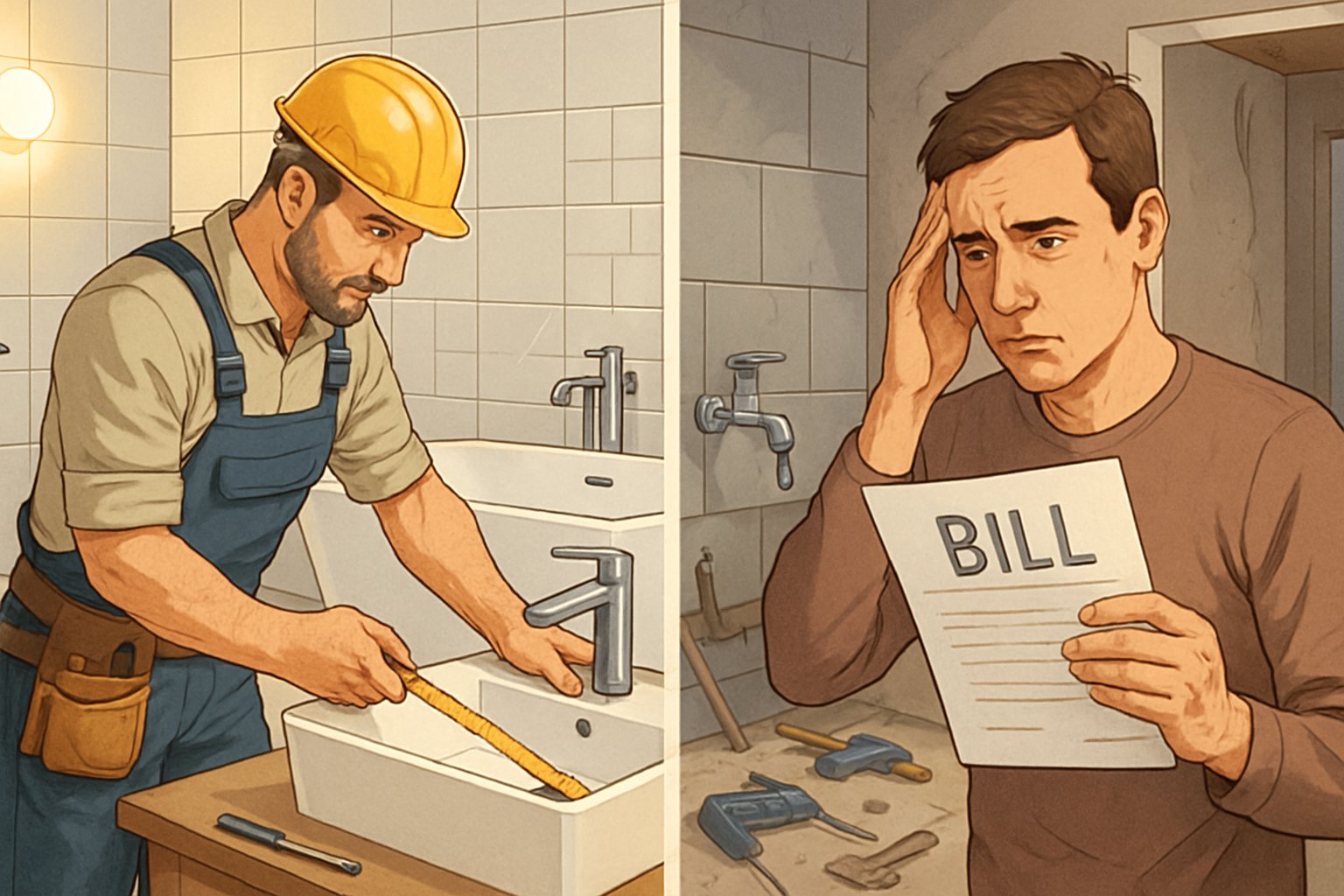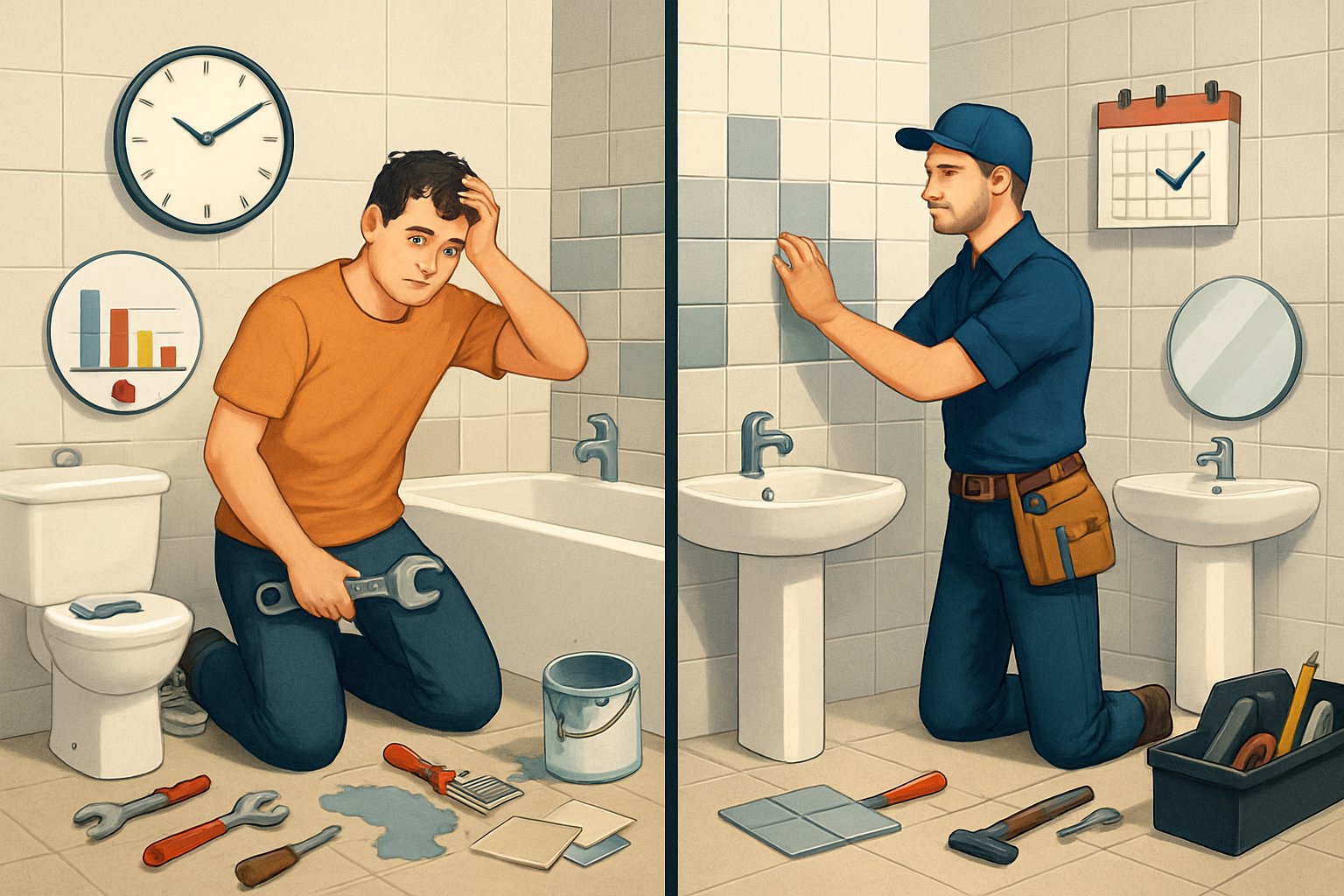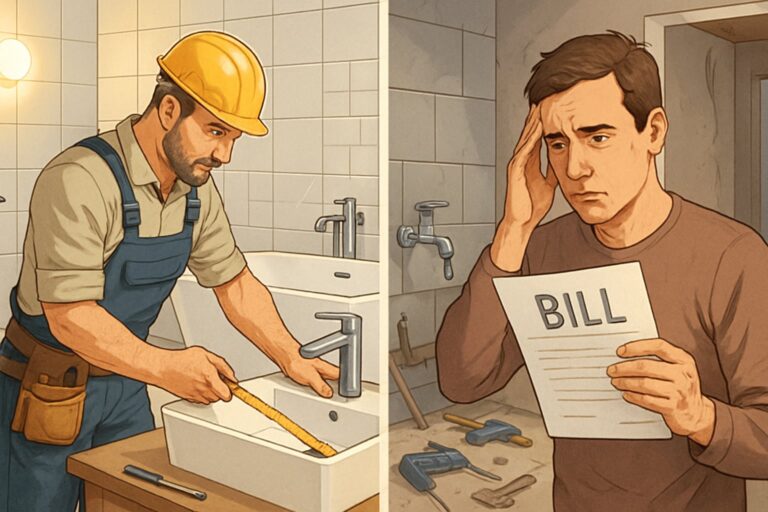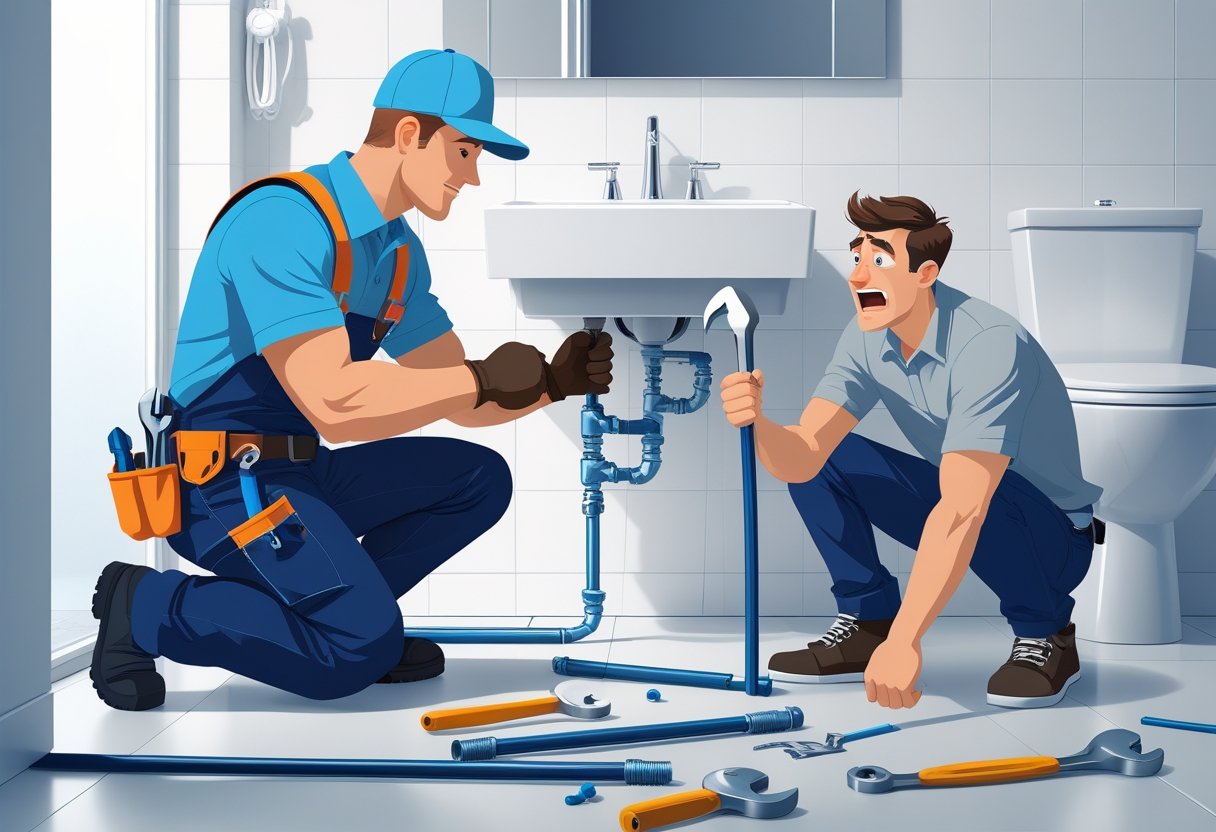Planning a bathroom remodel? The big question always pops up: should you hire a pro or just roll up your sleeves and do it yourself?
This choice has ripple effects on your budget, timeline, and especially the final results. Hiring a professional contractor usually costs more upfront, but you get expert workmanship, proper permits, and warranty protection. DIY projects can save on labor but bring the risk of costly mistakes and safety headaches.

Professional contractors bring years of experience and connections to quality materials you probably can’t get on your own. They handle tricky plumbing and electrical work safely and keep everything up to code.
But let’s be honest, hiring a pro means higher costs and less control over your schedule.
Need a Home Fix – Emergency or Routine?
From leaks and no-heat nights to simple tune-ups, our 24/7 hotline connects you with trusted local pros in minutes.
DIY remodels look appealing because they seem to offer big savings. You get to work at your own pace and call all the design shots.
Still, these projects can drag on way longer than you expect and often need skills most folks just don’t have.
Key Takeaways
- Professional contractors bring expertise and quality materials but cost more than DIY
- DIY remodels can save on labor but often cause mistakes, delays, and safety risks
- The best choice depends on your budget, skills, timing, and how complex your project is
Understanding Bathroom Remodeling Options
When you plan a bathroom remodel, you need to know what each approach really involves. Cost, time, and complexity all play a role in your choice.
Your remodeling goals will steer you toward the path that makes the most sense for you.
What Is a Professional Bathroom Remodel?
Hiring a pro means bringing in licensed contractors to run your renovation. These folks manage everything from design to installation.
They come with specialized skills. Plumbing, electrical work, and anything that needs a permit—pros handle all that.
Most contractors are licensed, bonded, and insured, so you get some extra peace of mind.
They have access to better materials and tools than most people can get. Some even offer in-house design services to help you plan the space.
Key services professionals provide:
- Design consultation and planning
- Permit acquisition and code compliance
- Plumbing and electrical work
- Material sourcing and installation
- Project management and scheduling
Professional remodels usually come with warranties on labor and materials. If something goes wrong later, you’re covered.
Key Differences Between DIY and Professional Bathroom Remodeling
DIY projects put you in the driver’s seat for every decision and task. You buy the materials, do the work, and set the pace.
Cost differences are huge. DIY saves on labor, but you might pay more for materials since you don’t have supplier hookups. Plus, you’ll need to buy or rent tools you don’t already own.
Time is another big factor. Pros can wrap up most remodels in a week or two. DIY? It can stretch into months, especially if you’re working around your job or family.
Quality and safety are real concerns. Pros have the training and experience for tricky stuff. DIY work can fall short of code or safety standards if you don’t know what you’re doing.
Permits and inspections are part of most major remodels. Pros handle it all, but if you DIY, you’re on your own for that paperwork.
Assessing Your Remodeling Goals
Your goals should guide whether you go DIY or hire help. What’s most important to you?
Budget is always a biggie. Set a realistic number, and remember, DIY can go over if you make mistakes or need more materials than planned.
Timeline matters. Need your bathroom back ASAP? Pros move faster. If you’re in no rush, DIY might be fine.
Scope of work changes everything. Painting or swapping a faucet? DIY works. Moving plumbing or electrical? Better call in the experts.
Your skill level is huge. Be honest about your abilities. Bathrooms involve a lot of trades and technical know-how.
Thinking about resale? Professional work usually boosts home value more than a patchwork DIY job.
Benefits of Hiring a Pro for Your Bathroom Remodel
Pros bring serious skills, handle all the coordination, and finish faster than most homeowners could ever hope to. For a lot of people, that peace of mind is worth the cost.
Expertise and Quality Workmanship
Contractors have years of training and hands-on experience. They know how to solve problems that would leave most of us scratching our heads.
Technical Skills Matter These pros get plumbing codes, electrical rules, and structural quirks. They spot issues before they turn into expensive disasters.
Proper Tool Usage Contractors come with specialized tools that most homeowners don’t own. That means faster work and better results.
Material Knowledge They know which products hold up in wet spaces. That can save you from mold, leaks, and other headaches down the road.
Quality Standards Professional work usually looks cleaner and lasts longer. Tiles line up, fixtures sit straight, and finishes look sharp.
Project Management and Coordination
Remodeling a bathroom is like juggling. Pros handle the details so you don’t have to stress.
Scheduling Subcontractors They line up plumbers, electricians, tile guys—everyone shows up when they’re supposed to.
Material Ordering Contractors order what’s needed and schedule deliveries so you’re not left waiting on supplies.
Permit Handling They know the local codes. Pros pull permits and schedule inspections so you stay legal.
Problem Solving When things go sideways, pros fix it fast. They’ve seen it all and know who to call.
Faster Project Completion
Speed is a huge perk of hiring professionals. They’re working full days, not just weekends.
Full-Time Focus Crews put in 8-10 hours a day. DIYers usually squeeze in a few hours here and there, and it drags out.
Efficient Workflow Experienced teams know the right order for every step. They aren’t wasting time fixing rookie mistakes.
Team Approach Multiple workers tackle different jobs at once. One person does plumbing while another preps the walls.
No Learning Curve They already know the tricks. You’re not their first bathroom.
Drawbacks of Hiring a Professional Contractor
Hiring pros brings expertise and quality, but you’ll feel it in your wallet. You also give up some control, and scheduling can get tricky.
Higher Upfront Costs
Professional remodels require a bigger investment than DIY. Labor costs stack on top of materials, and your total can double or triple fast.
Contractors usually charge $5,000 to $15,000 for basic remodels. If you want something fancy, it can hit $20,000 or more.
That price includes their markup on materials and hourly rates for skilled labor. You miss out on the savings from doing the work yourself.
Even simple tasks like painting, demo, or swapping fixtures could save you hundreds if you tackle them solo.
Extra costs can include:
- Design consultation fees
- Project management charges
- Insurance and licensing
- Permit handling fees
These upfront expenses strain a lot of budgets. Sometimes you have to pay a big chunk before work even starts.
Limited Creative Control
Working with contractors means you give up some say in the project. They might nudge you toward standard designs or materials they know well.
Most contractors have their own processes and favorite suppliers. That can limit your options compared to DIY, where you call every shot.
If you want something really custom, you might get pushback. Contractors sometimes steer clear of complex designs or unfamiliar materials.
Common limitations:
- Restricted material choices
- Standard fixture placements
- Not much customization
- Pressure to use their preferred brands
Some contractors just don’t get your vision. You could end up compromising on things you really wanted.
Dependence on Contractor’s Schedule
Your timeline depends on the contractor’s calendar, not yours. You can’t always control when they start or how fast they move.
Busy pros might not start for weeks—or even months. The best ones book up fast, especially during peak seasons.
Delays happen a lot, whether it’s materials, weather, or other emergencies. Your remodel could take twice as long as you expected.
You also can’t pause or adjust the timing for your own needs. Once work starts, you’re locked into their schedule, even if it disrupts your routine.
Comparing with DIY Bathroom Remodeling

DIY bathroom remodeling gives you three big perks: you save a lot on labor, you control every design choice, and you get to pick up some handy skills along the way.
Potential Cost Savings of DIY
Labor can eat up 35-50% of a remodel budget. If you do the work, you keep that cash in your pocket.
You can hunt for deals on materials at discount stores or wait for sales. Home Depot’s clearance aisle can be a goldmine sometimes.
No contractor markup means you pay what the store charges. Contractors often add 10-20% to cover their overhead.
Some simple updates don’t even need permits. Painting, swapping fixtures, or laying new flooring might not require any paperwork at all.
Your timeline is yours. You can wait for the best deals or buy materials when prices drop.
But when mistakes happen, they can get expensive. If you bust a pipe or mess up the wiring, repairs might cost more than hiring a pro in the first place.
Control Over Design and Materials
You make every design decision. No need to compromise with a contractor’s preferences or work around their schedule.
Your material choices aren’t stuck with what contractors usually use. Pick out unique tiles, fixtures, or finishes that match your exact vision—why settle?
Quality control stays in your hands. You decide where to focus your attention and what details really matter.
If you want to change plans halfway through, go for it. Add extra shelving or switch up the paint color—no change order fees or awkward conversations.
Your personal style shows through because nobody else is steering the ship. The finished bathroom ends up looking exactly like you pictured it.
Shopping gets a lot more personal. You can bounce between stores, compare options, and take your time finding what feels right.
Developing New Skills
Bathroom remodeling teaches valuable skills that come in handy for future home projects. Tiling, plumbing basics, and even a bit of electrical work become part of your toolkit.
You pick up knowledge about building codes and the right installation techniques. That makes it easier to spot issues elsewhere in your house.
Tool ownership expands your capabilities. The tools you buy for this project stick around for whatever else you want to tackle.
Problem-solving gets easier as you figure out fixes for unexpected hiccups. Every obstacle ends up teaching you something new about how houses actually work.
YouTube and online tutorials are a goldmine. Pause, rewind, and learn at whatever pace works for you.
The sense of accomplishment after finishing a big project is real. It builds confidence for whatever comes next, and your DIY skills just keep getting more valuable.
Risks and Challenges of DIY Bathroom Remodels
DIY bathroom remodels usually take longer than people expect. Permit problems can pop up if you don’t do things by the book, and mistakes can get expensive fast.
Time Commitment and Disruptions
A DIY bathroom remodel almost always drags on. What seems like a weekend project can easily stretch into weeks—or months.
You end up researching techniques, shopping for materials, and learning new skills as you go. Every task takes longer when you’re figuring it out on the fly.
Common time factors include:
- Multiple trips to hardware stores for supplies
- Learning how to use new tools properly
- Fixing mistakes and redoing work
- Waiting for deliveries and special orders
Your daily routine gets thrown off for a while. You might have to use other bathrooms at home or ask neighbors for a favor.
Remodeling eats into your work and family time. It can get stressful when it takes over your weekends or evenings for months.
Professional contractors finish the same work in days or weeks, not months.
Possible Code or Permit Issues
Many DIY remodels break local building codes without homeowners realizing it. That can cause headaches down the line.
Code issues often involve:
- Electrical work not meeting safety standards
- Plumbing that does not follow local rules
- Ventilation systems installed incorrectly
- Wrong materials used in wet areas
Some folks skip permits to save money. That move backfires when you need inspections or try to sell your place.
Building inspectors can force you to tear out finished work if it doesn’t meet code. You pay twice—once for your effort, again for a pro to fix it.
If you don’t have the right permits, insurance might not cover damage. Home value can drop if buyers spot unpermitted work.
Common DIY Mistakes
Homeowners often run into expensive mistakes that need professional repairs. These errors can cost more than hiring a pro from the start.
Frequent DIY problems include:
- Water damage from improper waterproofing
- Electrical shorts from wrong wire connections
- Leaky pipes from poor plumbing joints
- Cracked tiles from uneven surfaces
Using the wrong materials—like regular drywall instead of moisture-resistant types—leads to mold problems fast.
Measuring errors waste money on materials that don’t fit. You can’t really return cut tiles or custom fixtures.
Tool mistakes can mess up expensive fixtures or even cause injuries. Power tools around water and electricity? That takes skill.
Small errors add up. A slightly crooked shower pan can let water pool and rot your floor joists over time.
Deciding Whether to Hire a Pro or Go DIY
Choosing between hiring a pro or going DIY boils down to three things: how complicated your remodel is, your budget and schedule, and your experience with home improvement projects.
Evaluating Project Complexity
Simple updates—like painting walls or swapping out a toilet seat—are perfect for DIY. Basic tools and a little patience go a long way.
Complex projects require professional help:
- Moving plumbing lines or electrical outlets
- Installing new shower or bathtub systems
- Removing or adding walls
- Major tile work or waterproofing
If your remodel involves permits, you’re better off with a contractor. Most places require permits for electrical, plumbing, and structural changes.
Safety risks go up with complex work. Water damage from bad plumbing can get pricey. Messing up electrical work is just dangerous.
Think about the tools you’ll need. Professional-grade tile saws and plumbing tools aren’t cheap, but contractors already have them.
Budget and Timeline Considerations
DIY projects seem cheaper at first, but hidden costs sneak in. You’ll pay for tools, materials, permits, and fixing any mistakes.
Real savings come from skipping labor costs. Labor is usually 40-60% of a bathroom remodel. A $15,000 pro job might run $8,000 in materials if you do it all yourself.
Don’t forget your time. A weekend project can easily balloon into weeks or months. Pros usually finish in 1-3 weeks.
Mistakes can get expensive. If you mess up waterproofing behind tiles, you might have to rip out the whole shower later.
Contractors give you upfront estimates. DIY budgets often double thanks to surprises and wasted materials.
Personal Skills and Experience
Be honest with yourself before starting a bathroom remodel. Check your skills in:
- Basic plumbing (connecting pipes, fixing leaks)
- Electrical work (installing outlets, switches)
- Tile installation and grouting
- Measuring and cutting materials accurately
If you’ve done home improvement before, small projects are manageable. First-timers should stay away from complex bathroom work.
Time matters as much as skill. Even experienced DIYers need full weekends over several months to finish a bathroom remodel.
Can you live without a working bathroom for a while? Pro crews keep downtime short because they work fast and in phases.
Learning new skills on the fly during a big project usually leads to expensive mistakes. Try smaller projects first before risking pricey bathroom materials.
Frequently Asked Questions
Professional bathroom remodeling comes with a lot of decisions—cost, picking the right contractor, following building codes, and just managing the chaos. Here are some common questions and answers to help you know what to expect if you go the pro route.
What are the benefits of hiring a professional for my bathroom renovation?
Professional contractors bring years of experience to the table. They know how to handle tricky plumbing and electrical work safely.
You get access to better materials thanks to their supplier connections. Contractors can usually snag discounts regular homeowners can’t get.
Licensed pros carry insurance and bonding, so you’re covered if something goes wrong during the job.
They finish projects a lot faster than most DIYers. With the right tools and know-how, they avoid mistakes that slow things down.
Professional work can boost your home’s value more than DIY. Quality installation and materials really stand out when it’s time to sell.
How can I assess the cost-effectiveness of a professional bathroom remodel versus a DIY approach?
Add up the cost of materials, tools, and permits for DIY. Don’t forget to count the time you’ll spend running to stores and fixing mistakes.
Put a price on your time, too. DIY projects almost always take two or three times longer than you expect.
Think about the cost of fixing errors. Bad installation can cause water damage or code violations that get expensive fast.
Professional estimates include labor, materials, and project management, so you get a clear budget with fewer surprises.
Compare how long professional work will last versus DIY. Good installation usually means fewer repairs down the road.
What should I look for when selecting a contractor for bathroom remodeling?
Make sure contractors have the right licenses for your area. Double-check their insurance and bonding.
Read reviews on Google and the Better Business Bureau. Look for trends in feedback about quality and reliability.
Ask for references from recent jobs. Actually call those homeowners and ask how things went.
Get detailed written estimates from at least three contractors. Compare what’s included in each one.
Find contractors who specialize in bathrooms. They know the unique headaches that come with moisture, ventilation, and tight spaces.
How does hiring a professional help with adhering to building codes and permits for bathroom renovations?
Licensed contractors know local building codes and permit rules. They’ll handle paperwork and schedule inspections for you.
They understand which changes need permits. Moving plumbing or electrical almost always needs approval.
Contractors work with local inspectors all the time. They know what to expect and how to pass inspections on the first try.
Permits protect your home’s value and insurance coverage. Skipping them can cause headaches when you want to sell.
Professional work meets safety standards for electrical and plumbing. That keeps your family safer from things like electrical fires or water leaks.
What are the potential drawbacks of outsourcing my bathroom remodel to a professional?
Hiring a pro costs more upfront than DIY. Labor usually makes up 35-50% of the total bill.
You give up some control over the daily schedule and pace. Contractors might juggle more than one project at once.
Communication can break down if you’re not clear about expectations. Some contractors don’t update clients as often as they should.
You’re also at the mercy of their schedule. Delays happen—sometimes it’s material shortages, sometimes it’s just bad timing.
Quality varies from one contractor to the next. Pick the wrong pro, and you might end up frustrated with the results.
How do professional bathroom remodel services handle unexpected issues during the renovation process?
Experienced contractors know to expect hidden water damage or outdated plumbing. They set aside extra time and money for surprises.
These pros can usually troubleshoot on the fly. They don’t waste time searching for how-to guides or second-guessing their skills.
If the project grows, licensed contractors handle permit changes themselves. They’ve been through the process enough times to keep things legal and safe.
When problems pop up, good contractors let you know right away. They’ll walk you through your options and share updated cost estimates before doing anything extra.
And if you suddenly need new materials, they’ve got connections with suppliers. That means they can usually get what’s needed fast—even on short notice.







Leave a Reply